PRINCETON, NJ -- Americans are most likely to say they would seek vehicles that get better gas mileage if gas prices keep rising but don't go above the $5-per-gallon range. Americans are second most likely to say they would use mass transit. Seven in 10 Americans would not move and about the same number of workers would not change jobs or quit working, no matter how high prices rise.
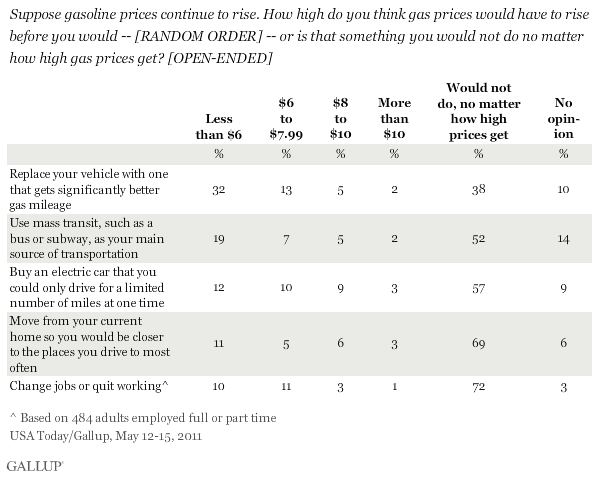
Assuming gas prices continue to rise but don't go above the $5 range, about one in three Americans would seek to replace their current vehicle with one that gets better gas mileage. Another 13% would do so if gas prices rise to at least $6 a gallon but less than $8, but 38% would not do so no matter the price.
About one in three Americans say they would seek a more fuel-efficient car if gas prices continue to increase as high as the $5 range, regardless of income or their views of whether higher gas prices are temporary or permanent.
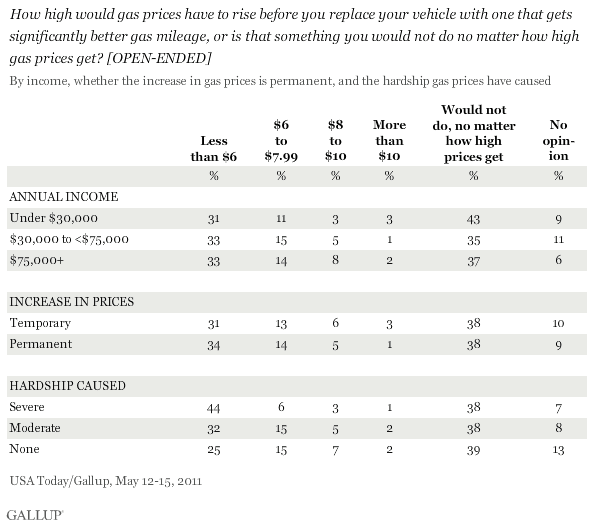
However, 44% of those who say recent increases in gas prices are causing them "severe" financial hardship would replace their vehicle at prices up to the $5 range, while 25% of those experiencing no financial hardship would do so.
Similarly, 37% of those who say they drive more than average or drive an average amount would get a more fuel-efficient vehicle, while 28% of those who say they drive less than average would replace their current vehicle at prices up to the $5-per-gallon range.
Low-Income Americans Most Likely Among Income Groups to Look to Mass Transit
Americans making less than $30,000 a year (32%) are more likely than those making $75,000 or more (11%) to say they will use mass transit if gas prices rise to the $5-per-gallon range. Those currently experiencing severe financial hardship because of gas prices (25%) are more likely than those experiencing no hardship (13%) to say the same.
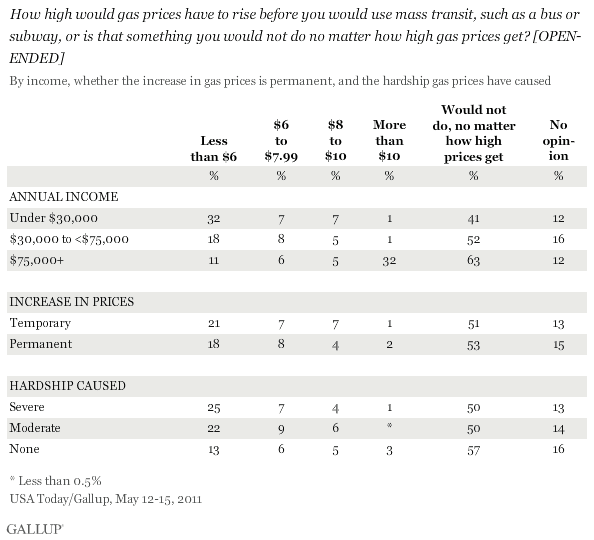
Electric Cars Not an Attractive Option to Many Americans
Americans are less likely to say they would buy an electric car than they are to say they would buy a more fuel-efficient one if gas prices rise to the $5-per-gallon range. Just 12% say at that price, they would be willing to buy such a car that they could drive only a limited number of miles at one time. Another 10% would make such a purchase if gas prices are in the $6- to $7.99-per-gallon range and another 9% if gas prices reach $8 to $10 per gallon. Still, 57% say they would not buy such an electric car no matter the price of gas.
High-income Americans are about twice as likely as those with low incomes to say they would purchase an electric car if gas prices rose to the $5 range. Otherwise, no matter whether respondents view higher prices as temporary or permanent, or the degree of financial hardship high gas prices are causing them, electric cars are equally unpopular as a response to high gas prices.
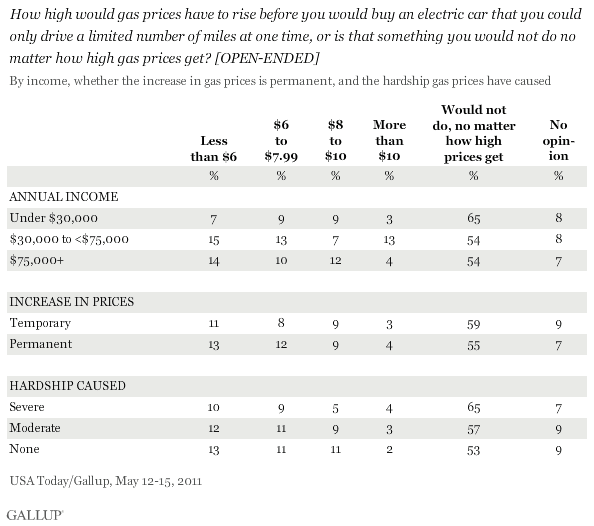
Low-Income Americans Most Open to Moving
Low-income Americans (20%) and those who are experiencing severe financial hardship from gas prices (15%) are among the most likely to say they would move from their current home to deal gas costs in the $5-per-gallon range. Americans who drive more than average (17%) are also more likely to say they would move than are those who drive less than average (9%).
Still, at least 6 in 10 Americans -- no matter their view of higher prices as temporary or permanent or their degree of financial hardship from current gas prices -- say they would not move regardless of gas prices.
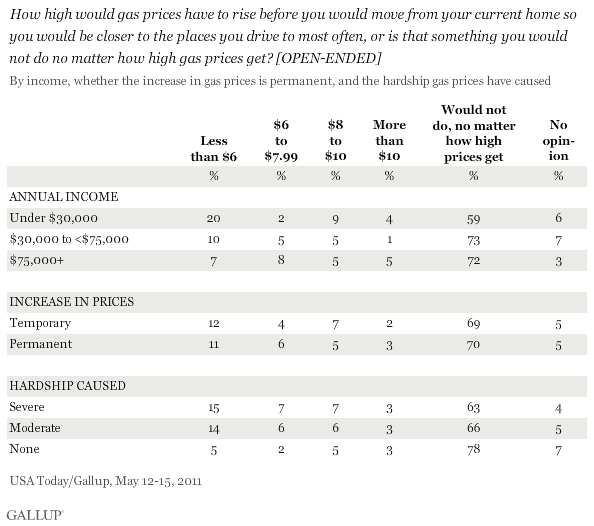
Employed Americans across demographic groups are about equally unwilling to change or quit their jobs. Even 55% of those experiencing severe financial hardship would not change jobs or quit working, regardless of how high gas prices rise.
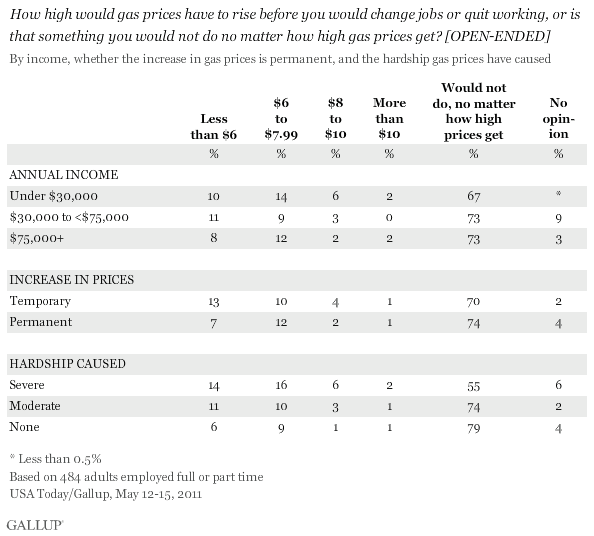
Implications
One of the problems with volatile gas prices -- as reflected by the drop in prices over the past week -- is that most Americans cannot respond immediately to them by significantly adjusting their lifestyles. However, they can do so over time. By asking Americans at what price point they might react in a potentially significant way, Gallup sought to gain insight into consumer price sensitivity (price elasticity) and the resulting future consumer behaviors.
The intention of one in three Americans to purchase a more fuel-efficient vehicle and one in five to use mass transit if gas prices go no higher than the $5 range illustrates some of the ways high gas prices can significantly alter consumer behavior. These findings might be good news for the makers of more fuel-efficient vehicles and bad news for those producing trucks and SUVs, particularly if the current situation persists. Even electric cars could benefit if prices get high enough for long enough. High gas prices might also be good for both mass transit and the environment over time.
However, such shifts in consumer behavior are likely to take years. But, high gas prices are already causing severe financial hardship for many Americans -- 67% say they are experiencing financial hardship right now. In turn, continued high and increasing gas prices would create similar stress for the U.S. economy as a whole. At the same time, however, it seems as though even very high gas prices are unlikely to compel many Americans to change such basic aspects of their lives as where they live, where they work, or whether they work.
Americans are now predicting that pump prices will reach $4.52 a gallon this year. Even with such price expectations, most Americans seem unwilling and/or unable to significantly change their overall lifestyles -- making relatively minor behavioral changes instead. More importantly, most Americans suggest this will continue to be the case even if gas prices stay high and go higher, seemingly validating the carbon-based nature of the U.S. economy. Instead, it seems Americans will cut back in other areas by spending less -- not good news for the nation's retailers, small businesses, or the future course of the U.S. economy.
Survey Methods
Results for this Gallup poll are based on telephone interviews conducted May 12-15, 2011, with a random sample of 1,024 adults, aged 18 and older, living in all 50 U.S. states and the District of Columbia.
For results based on the total sample of national adults, one can say with 95% confidence that the maximum margin of sampling error is ±4 percentage points.
For results based on the sample of 484 adults employed full or part time, the maximum margin of sampling error is ±5 percentage points.
Interviews are conducted with respondents on landline telephones and cellular phones, with interviews conducted in Spanish for respondents who are primarily Spanish-speaking. Each sample includes a minimum quota of 400 cell phone respondents and 600 landline respondents per 1,000 national adults, with additional minimum quotas among landline respondents for gender within region. Landline telephone numbers are chosen at random among listed telephone numbers. Cell phones numbers are selected using random digit dial methods. Landline respondents are chosen at random within each household on the basis of which member had the most recent birthday.
Samples are weighted by gender, age, race, Hispanic ethnicity, education, region, adults in the household, and phone status (cell phone-only/landline only/both, cell phone mostly, and having an unlisted landline number). Demographic weighting targets are based on the March 2010 Current Population Survey figures for the aged 18 and older non-institutionalized population living in U.S. telephone households. All reported margins of sampling error include the computed design effects for weighting and sample design.
In addition to sampling error, question wording and practical difficulties in conducting surveys can introduce error or bias into the findings of public opinion polls.
View methodology, full question results, and trend data.
For more details on Gallup's polling methodology, visit www.gallup.com.
